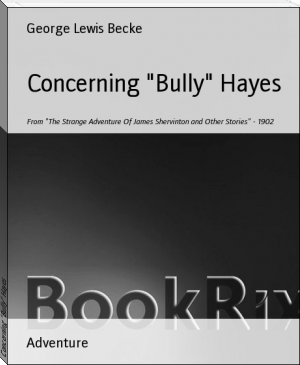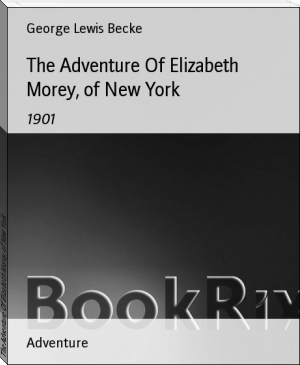Ridan The Devil And Other Stories - George Lewis Becke (free ebooks for android txt) 📗

- Author: George Lewis Becke
Book online «Ridan The Devil And Other Stories - George Lewis Becke (free ebooks for android txt) 📗». Author George Lewis Becke
place, named Liki Liki Bay, near Cape St George, and, after a preliminary orgie on board, the enthusiastic colonists set to work house-building and clearing the primaeval forest for the grape and fig crop. But as there were about two thousand and ninety trees to the hectare, and every tree was joined to its neighbours by vines as thick as a ship's main-mast, the work proceeded but slowly. Considerable time was lost, also, by each man dropping his axe twice in ten seconds to kill the mosquitoes which stung him severely. After a few days of this the founders of New France decided to return to Europe, and, duly arming themselves, went on board and interviewed the captain. The captain, MacLachlan, was a Scotchman by birth, but a naturalised Frenchman. He was also a humorist in a grim sort of way. On the voyage out he and M. de Villacroix, who was the temporary Governor, found that the eighty gentlemen colony founders were a pretty rough lot, who wanted to take charge of the ship. MacLachlan, who was a man of energy, brought them to reason by tricing seven of them up to the rigging by their thumbs, and promised to 'deal severely' with them next time. So when they boarded the _Chandernagore_ and informed him that he must take them back to France, he answered by hunting them ashore again, landing six months' provisions, and sailing for Sydney, according to instructions from the Marquis. On arriving at Sydney he chartered a schooner, loaded her with provisions and agricultural machinery, and despatched her to Liki Liki Bay. Rough and cruel as he may appear, MacLachlan was the right sort of man to master insubordination and mutiny. I knew the man well, and know that he knew the ruffianly element he had to deal with in the first lot of colonists, and dealt with it in a proper and summary manner. Had there been half a dozen more such men as himself and Villacroix to back him up, the tragic ending of the ill-fated expedition would have been averted.
But meantime the second contingent was preparing to leave, and the steamer _Genii_ was bought by the Marquis to load another cargo of deluded emigrants at Marseilles and Barcelona. Like Villacroix and MacLachlan, her captain (Rabardy) was a man in whom he reposed implicit trust; and, indeed, Du Breil seems to have been at least fortunate in the choice of his sea-leaders to conduct his deplorable colonists to their Paradise. Under other and less determined men the loss of life would have been terrible. MacLachlan's letters from Sydney had warned him of one source of danger--mutiny--and Du Breil decided to send out with the second contingent a military guard. From the Italian and Spanish 'settlers' there was nothing to fear. Whatever they suffered they suffered in silence, like sheep; and the presence of several priests (going out to preach in the handsome stone cathedrals and churches before mentioned), whom they looked up to with simple reverence, was a surer safeguard for their good conduct than a company of troops. The married men among the French contingent of the second lot were like them in this respect; but, all through the course of the disastrous expedition, it was cursed by the inclusion of a number of unmarried man, whose ruffianism proved too strong to be checked; then there were a number of _nymphes du pavi_, recruited from the streets of Marseilles and Toulon. 'They came on board as unmarried women, but an "arrangement" in each case was made with one of the single men to play M. le Mari,' said one of the leaders, to the writer, when he lay dying of fever in the _Genil's_ stifling saloon at Duke of York Island. Who can wonder at the collapse of the 'colony,' when practices such as these were tolerated? But it is typical of the system, or rather want of system, of French colonisation generally. On March 16th the _Genii_ left Barcelona with over two hundred and fifty colonists--men, women and children. Some of the Italians were from the north--these were hard-working and intelligent--some from Calabria--little better than beasts of the field--and the Spaniards came from Valencia and Catalonia. The military guard consisted of a Spanish captain and lieutenant and an Italian lieutenant, while the rank and file were of various nationalities. Before the crazy old _Genii_ reached Port Said the guard themselves made matters warm, and, with the first and second engineers and second officer, refused to proceed. Rabardy, the captain, gladly let them go at Port Said and made for the Maldive Islands, where he engaged thirty Arabs. Later on he put these ashore at Point de Galle. At Singapore the vessel remained six weeks, waiting for instructions, and then reached Liki Liki Bay fifteen days later--to find the place abandoned and the beach covered with the stores left there by the _Chandernagore_ party, who had escaped to Australia; this he learned two days later from the white traders at Mioko, the settlement on Duke of York Island, twenty or thirty miles away. Rabardy was at his wit's end. He knew that another steamer was due in a month or two, and determined to wait and consult with the new Governor, who was coming out with a fresh batch of three hundred people. No work at settlement was begun, for Rabardy considered the former site could be bettered. Meanwhile, there arrived a barque of one thousand tons, the _Marquis de Rays_, deeply laden with cotton and sugar machinery, stores, provisions and medicines, and a large amount of trade goods for barter with the natives. These latter, although not cannibals like the people of the neighbouring Island of New Britain, were a very low type of savages, and their mode of life was disgusting in the extreme; whilst their wild and ferocious appearance was in harmony with their stark nudity. Still the _Genil's_ people established friendly relations with them, and were supplied with fruit and vegetables, such as yams and taro.
On October 17th the steamer _India_ arrived with her emigrants, and the new Governor, M. de Prevost, nothing daunted by the unfortunate previous experiences of the colony and its mismanagement, set to work with Captain Rabardy to get things in order.
A fresh site was chosen for the actual settlement, and the new arrivals, joining heartily with the _Genil's_ people, began to clear and build. The Italians and Spaniards toiled, in happy expectation of future prosperity, with their French fellow-settlers, and hope ran high. But already the deadly malaria had begun its work, and ere long more than half of the many hundreds of colonists were suffering from fever, and soon some died. Then suddenly the Governor, who hitherto had cheered them up by his example and energy, announced his intention of going to Sydney in the _Genii_ (the _India_ had sailed for France) to procure cattle and a fresh stock of provisions. He never returned. Months and months went by, and the colonists waited and waited, while the fever carried off someone every few days; and then their hearts failed them, and they longed for the lands they had left for a chimera. A sad two months passed, and then one day another steamer--the _Nouvelle Bretagne_--came into Liki Liki Bay. She had brought out some three hundred more colonists, Spanish people, who listened, with doleful faces, to the tale of those who had preceded them to the Utopia of Charles du Breil. Rabardy, of the _Genil_, who, a month later, was to die of fever, game to the last, consulted with Captain Henry, of the _Nouvelle Bretagne_ and, as they talked on the poop deck of the newly-arrived steamer, a cry came from the people on shore that another ship was in sight. An hour later a black-painted, unobtrusive-looking steamer came slowly into the bay and dropped anchor. She looked like a collier, and flew the red ensign of England; but Henry knew her. She was the _Legaspi_, Spanish gunboat from Manila, and had chased him from the Philippines. As her cable rattled through her hawsepipes, down went the red ensign and up went the Spanish colours, and a boat full of armed men dashed alongside the _Nouvelle Bretagne_, and in another five minutes Captain Henry was a prisoner, handcuffed, and on his way to the warship. What he had done at Manila was a daring deed enough, and is a story in itself, and nothing much to his discredit. His ship had been prevented from putting to sea by the Spanish authorities, and Henry, who had many sick on board, and was greatly harassed in mind, suddenly slipped his cable and steamed off, although there was a Spanish guard on board. These he landed on the coast of Luzon.
That evening the commander of the _Legaspi_ called the Spanish emigrants together and addressed them. 'The colony is a failure; the French, Italian and Spanish Governments have repudiated it. Those of you who like to return with the _Legaspi_ to Manila can do so; those who do not may remain here, to die of starvation or be eaten by the savages.'
Next morning the _Legaspi_ steamed out of Liki Liki Bay with the _Nouvelle Bretagne_ in tow, taking; all the Spanish colonists with her. Then, to the aid of the despairing French and Italian colonists, came one Tom Farrell, an English trader on the Duke of York Island. He gave them provisions, advanced them money, and treated them well, taking care to get possession of the _Genil_ and the barque _Marquis de Rays_. The _Genil_ he sent to Australia under command of an English captain (Rabardy was dead by then, and his dying words to the writer of this sketch, as he grasped his hand for the last time, were, 'I have tried--and failed. I had not one competent officer with me to help me to maintain my authority or shoot some of the ruffians who have ruined the expedition'). Her unfortunate passengers were generously treated by the New South Wales Government, who settled many of them on the Richmond River, in the northern portion of the colony. Here they founded a prosperous little settlement, and are to this day happy and contented, and thank their stars that they left a spurious Utopia to dwell in a country where the conditions of climate are like those of their own sunny Italy. Perhaps, however, they think sometimes of those of their former comrades who died out there in the savage 'colony' of Charles du Breil. At Liki Liki there died nine; at Duke of York Island, thirteen; at New Britain, twenty-one; and six were eaten by the cannibals of the islands thereabouts. Of a score or so of others who remained in the North-West Pacific there is no record. Probably they succumbed to fever, or went down under the clubs and spears of the wild people of New Britain, New Guinea and the Admiralty Group. Such was the end of the vision of Charles du Breil and the Colony of New France.
THE WHITE WIFE AND THE BROWN 'WOMAN'
But meantime the second contingent was preparing to leave, and the steamer _Genii_ was bought by the Marquis to load another cargo of deluded emigrants at Marseilles and Barcelona. Like Villacroix and MacLachlan, her captain (Rabardy) was a man in whom he reposed implicit trust; and, indeed, Du Breil seems to have been at least fortunate in the choice of his sea-leaders to conduct his deplorable colonists to their Paradise. Under other and less determined men the loss of life would have been terrible. MacLachlan's letters from Sydney had warned him of one source of danger--mutiny--and Du Breil decided to send out with the second contingent a military guard. From the Italian and Spanish 'settlers' there was nothing to fear. Whatever they suffered they suffered in silence, like sheep; and the presence of several priests (going out to preach in the handsome stone cathedrals and churches before mentioned), whom they looked up to with simple reverence, was a surer safeguard for their good conduct than a company of troops. The married men among the French contingent of the second lot were like them in this respect; but, all through the course of the disastrous expedition, it was cursed by the inclusion of a number of unmarried man, whose ruffianism proved too strong to be checked; then there were a number of _nymphes du pavi_, recruited from the streets of Marseilles and Toulon. 'They came on board as unmarried women, but an "arrangement" in each case was made with one of the single men to play M. le Mari,' said one of the leaders, to the writer, when he lay dying of fever in the _Genil's_ stifling saloon at Duke of York Island. Who can wonder at the collapse of the 'colony,' when practices such as these were tolerated? But it is typical of the system, or rather want of system, of French colonisation generally. On March 16th the _Genii_ left Barcelona with over two hundred and fifty colonists--men, women and children. Some of the Italians were from the north--these were hard-working and intelligent--some from Calabria--little better than beasts of the field--and the Spaniards came from Valencia and Catalonia. The military guard consisted of a Spanish captain and lieutenant and an Italian lieutenant, while the rank and file were of various nationalities. Before the crazy old _Genii_ reached Port Said the guard themselves made matters warm, and, with the first and second engineers and second officer, refused to proceed. Rabardy, the captain, gladly let them go at Port Said and made for the Maldive Islands, where he engaged thirty Arabs. Later on he put these ashore at Point de Galle. At Singapore the vessel remained six weeks, waiting for instructions, and then reached Liki Liki Bay fifteen days later--to find the place abandoned and the beach covered with the stores left there by the _Chandernagore_ party, who had escaped to Australia; this he learned two days later from the white traders at Mioko, the settlement on Duke of York Island, twenty or thirty miles away. Rabardy was at his wit's end. He knew that another steamer was due in a month or two, and determined to wait and consult with the new Governor, who was coming out with a fresh batch of three hundred people. No work at settlement was begun, for Rabardy considered the former site could be bettered. Meanwhile, there arrived a barque of one thousand tons, the _Marquis de Rays_, deeply laden with cotton and sugar machinery, stores, provisions and medicines, and a large amount of trade goods for barter with the natives. These latter, although not cannibals like the people of the neighbouring Island of New Britain, were a very low type of savages, and their mode of life was disgusting in the extreme; whilst their wild and ferocious appearance was in harmony with their stark nudity. Still the _Genil's_ people established friendly relations with them, and were supplied with fruit and vegetables, such as yams and taro.
On October 17th the steamer _India_ arrived with her emigrants, and the new Governor, M. de Prevost, nothing daunted by the unfortunate previous experiences of the colony and its mismanagement, set to work with Captain Rabardy to get things in order.
A fresh site was chosen for the actual settlement, and the new arrivals, joining heartily with the _Genil's_ people, began to clear and build. The Italians and Spaniards toiled, in happy expectation of future prosperity, with their French fellow-settlers, and hope ran high. But already the deadly malaria had begun its work, and ere long more than half of the many hundreds of colonists were suffering from fever, and soon some died. Then suddenly the Governor, who hitherto had cheered them up by his example and energy, announced his intention of going to Sydney in the _Genii_ (the _India_ had sailed for France) to procure cattle and a fresh stock of provisions. He never returned. Months and months went by, and the colonists waited and waited, while the fever carried off someone every few days; and then their hearts failed them, and they longed for the lands they had left for a chimera. A sad two months passed, and then one day another steamer--the _Nouvelle Bretagne_--came into Liki Liki Bay. She had brought out some three hundred more colonists, Spanish people, who listened, with doleful faces, to the tale of those who had preceded them to the Utopia of Charles du Breil. Rabardy, of the _Genil_, who, a month later, was to die of fever, game to the last, consulted with Captain Henry, of the _Nouvelle Bretagne_ and, as they talked on the poop deck of the newly-arrived steamer, a cry came from the people on shore that another ship was in sight. An hour later a black-painted, unobtrusive-looking steamer came slowly into the bay and dropped anchor. She looked like a collier, and flew the red ensign of England; but Henry knew her. She was the _Legaspi_, Spanish gunboat from Manila, and had chased him from the Philippines. As her cable rattled through her hawsepipes, down went the red ensign and up went the Spanish colours, and a boat full of armed men dashed alongside the _Nouvelle Bretagne_, and in another five minutes Captain Henry was a prisoner, handcuffed, and on his way to the warship. What he had done at Manila was a daring deed enough, and is a story in itself, and nothing much to his discredit. His ship had been prevented from putting to sea by the Spanish authorities, and Henry, who had many sick on board, and was greatly harassed in mind, suddenly slipped his cable and steamed off, although there was a Spanish guard on board. These he landed on the coast of Luzon.
That evening the commander of the _Legaspi_ called the Spanish emigrants together and addressed them. 'The colony is a failure; the French, Italian and Spanish Governments have repudiated it. Those of you who like to return with the _Legaspi_ to Manila can do so; those who do not may remain here, to die of starvation or be eaten by the savages.'
Next morning the _Legaspi_ steamed out of Liki Liki Bay with the _Nouvelle Bretagne_ in tow, taking; all the Spanish colonists with her. Then, to the aid of the despairing French and Italian colonists, came one Tom Farrell, an English trader on the Duke of York Island. He gave them provisions, advanced them money, and treated them well, taking care to get possession of the _Genil_ and the barque _Marquis de Rays_. The _Genil_ he sent to Australia under command of an English captain (Rabardy was dead by then, and his dying words to the writer of this sketch, as he grasped his hand for the last time, were, 'I have tried--and failed. I had not one competent officer with me to help me to maintain my authority or shoot some of the ruffians who have ruined the expedition'). Her unfortunate passengers were generously treated by the New South Wales Government, who settled many of them on the Richmond River, in the northern portion of the colony. Here they founded a prosperous little settlement, and are to this day happy and contented, and thank their stars that they left a spurious Utopia to dwell in a country where the conditions of climate are like those of their own sunny Italy. Perhaps, however, they think sometimes of those of their former comrades who died out there in the savage 'colony' of Charles du Breil. At Liki Liki there died nine; at Duke of York Island, thirteen; at New Britain, twenty-one; and six were eaten by the cannibals of the islands thereabouts. Of a score or so of others who remained in the North-West Pacific there is no record. Probably they succumbed to fever, or went down under the clubs and spears of the wild people of New Britain, New Guinea and the Admiralty Group. Such was the end of the vision of Charles du Breil and the Colony of New France.
THE WHITE WIFE AND THE BROWN 'WOMAN'
Masters, the trader at Fana 'alu, was walking up the beach to his house, reading a letter which he had just received from the captain of a passing vessel. It was from his employers in Sydney,--'We are confident that Mrs Masters and yourself will do all you can to render the lady's stay at Fana 'alu agreeable to her. You will find her husband, our new supercargo, a very fine fellow, easy to get on with, and a thoroughly honourable and conscientious business man.'
'Here, Melanie, old woman, where are you?' he called, as he flung himself lazily into a cane lounge on the verandah.
Melanie, who, native-like, was combing her hair in the sitting-room, rose from the mat upon which she was sitting and came to the door.
Free e-book «Ridan The Devil And Other Stories - George Lewis Becke (free ebooks for android txt) 📗» - read online now
Similar e-books:





Comments (0)